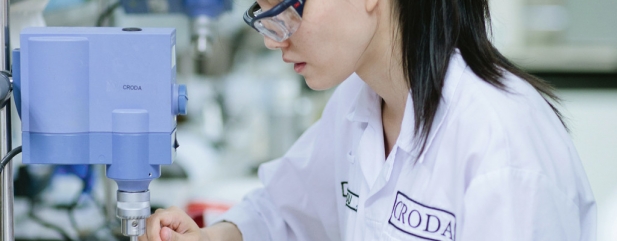Archived article
Please note that tax, investment, pension and ISA rules can change and the information and any views contained in this article may now be inaccurate.
Why Croda has the right formula for success

The outlook for chemicals firm Croda (CRDA) is looking more positive as its biggest division Personal Care continues to recover.
Last year, speciality products in this division struggled due to slower export markets and weaker customer demand.
Continued weakness in consumer spending in Latin America and Croda’s distributor exit programme also contributed, temporarily reducing the inventory pipeline.
Since the start of 2017, Croda has rallied nearly 18% to £38.66 (8 Sep 2017).
What does Croda do?
Croda creates and sells speciality chemicals for a range of products. Its core businesses are Personal Care, Life Sciences and Performance Technologies.
In Personal Care, Croda produces natural speciality oleochemical raw materials for health and beauty products such as moisturisers, sun cream, deodorants and colour cosmetic products.
The Life Sciences division focuses on products for the pharmaceutical and nutraceutical markets. It also develops products that help farmers achieve superior yields and improve seed performance.
Croda delivers innovative ingredients for lubricants, coatings, polymers, polymer additives, geo technologies and home care through its Performance Technologies business.
Why is personal care bouncing back?
Personal Care experienced encouraging progress as sales rose 2.3% in constant currency in the six months to 30 June 2017 as speciality products and trading in North America improved.
Morgan Stanley & Co’s Paul Walsh says the outlook for Personal Care has improved with management expecting 2% to 3% organic growth in the second half of the year.
One of the key selling points for Croda is that it appeals to companies that want to be sustainable, which is expected to benefit its Personal Care division.
According to Croda, over a quarter of customer product launches now make a sustainability claim. The chemicals firm is in a strong position to support this growing trend as approximately 60% of its raw materials come from natural sources.
Weaker pound to boost performance
UBS analyst Andrew Stott is reassured by the continued recovery in Performance Technologies as the 9.1% sales increase in the first half beat his forecast 7%.
He also highlights the beneficial impact of currency movements, which boosted sales by 12.4%.
Stott is confident that the weaker pound could help margins and market share, particularly in Performance Technologies as nearly a fifth of its sales are exports from the UK production base.
‘High barriers to entry'
Croda has the advantage of working in an industry with high barriers to entry because it invests significantly in research and development and infrastructure.
The company has constructed a $175m bio-surfactant plant in North America that is due to be commissioned in the second half of this year. Once it is up and running, the facility will replace petrochemical feedstocks with a new range of 100% sustainable products.
A diversified customer base also bodes well for Croda, with its top 10 customers only accounting for 20% of overall sales. The lack of dependency on key contracts means the chemical firm can focus on innovating thousands of products for various customers.
These customers include big firms such as L’Oreal and Head & Shoulders seller Procter & Gamble, as well as Swiss agri-chemicals producer Syngenta.
Improving sales trends
Over the last few years, Croda has experienced more subdued top line growth due to the broader economic environment, which has impacted the underlying sales performance.
The company is making good progress in returning to growth thanks to improving sales trends at the end of 2016, which have continued throughout the first half of the year.
In the six months to 30 June, Croda increased sales by 16% to £707.3m, driven by organic growth across the core businesses and positive currency movements.
Adjusted pre-tax profit in constant currency rose 4.4% to £169.7m, which is expected to increase to £330m in the year to 31 December 2018.
The group actually has a history of prioritising profit over market share gains and volume growth. That’s why past results have often shown solid profits despite weak sales.
According to Croda, innovation is the key to its organic growth and investment in faster growth niches to boost success in emerging markets such as Asia.
An example of this is the recent launch of Solaveil Clarus transparent sunscreen for ‘Asian-led trends’ and an expansion in bio-technology ingredients.
While organic growth is key to Croda’s future, there is potential for M&A activity as the company continues to evaluate opportunities, particularly from small technology businesses.
Important information:
These articles are provided by Shares magazine which is published by AJ Bell Media, a part of AJ Bell. Shares is not written by AJ Bell.
Shares is provided for your general information and use and is not a personal recommendation to invest. It is not intended to be relied upon by you in making or not making any investment decisions. The investments referred to in these articles will not be suitable for all investors. If in doubt please seek appropriate independent financial advice.
Investors acting on the information in these articles do so at their own risk and AJ Bell Media and its staff do not accept liability for losses suffered by investors as a result of their investment decisions.
 magazine
magazine











